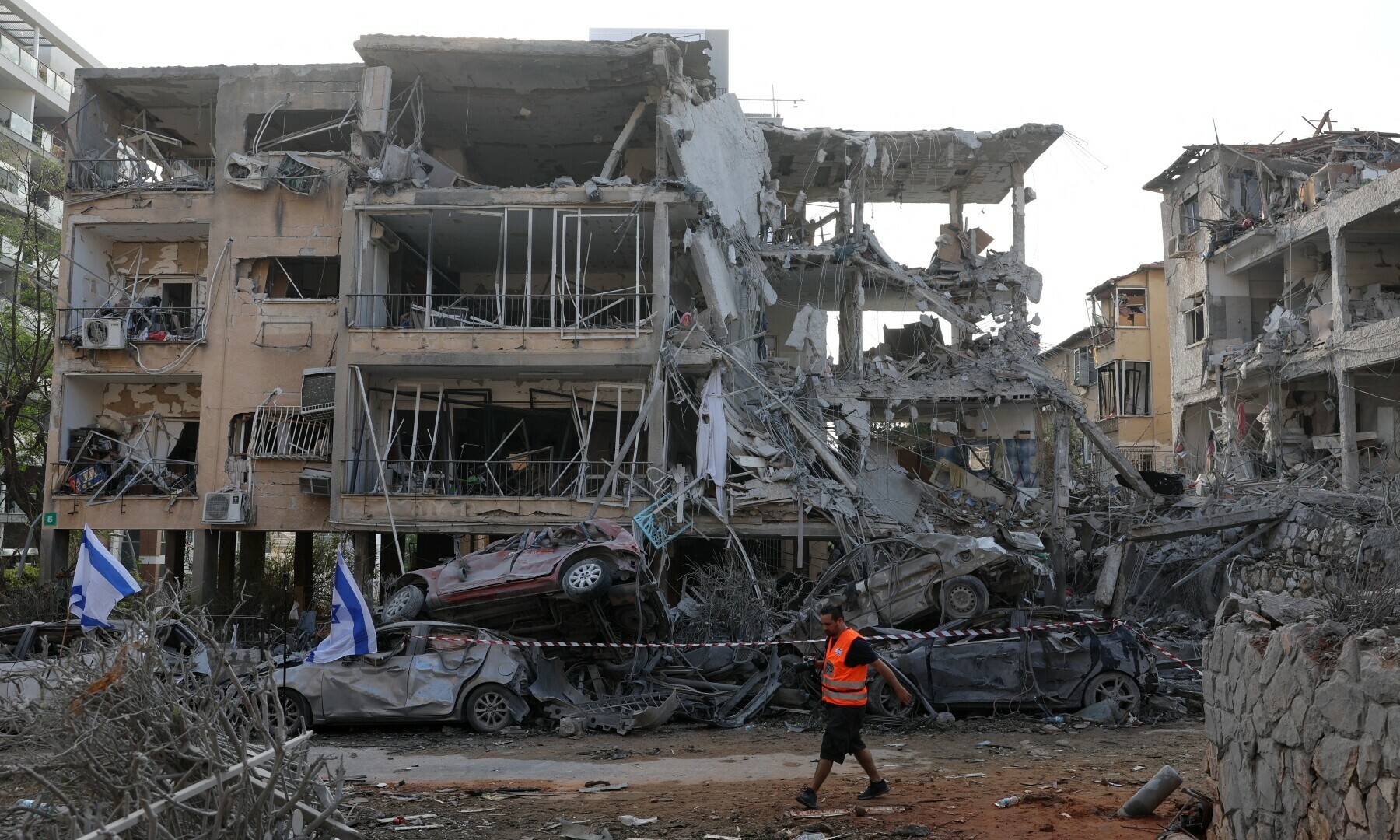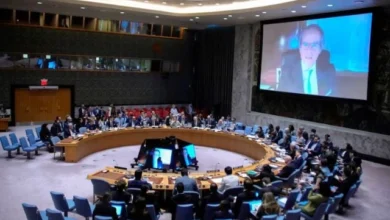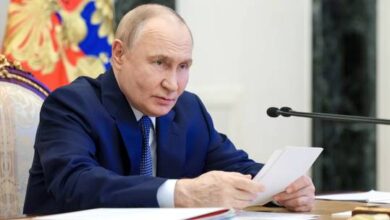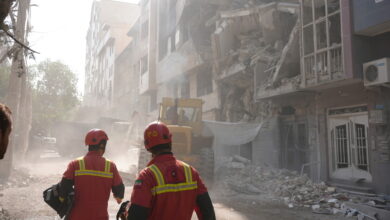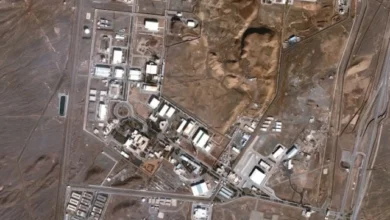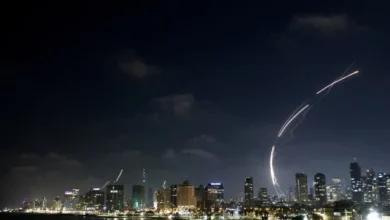Iran’s state TV said on Saturday that “heavy and destructive” attacks against Israel were expected within the coming hours, as the Israeli military continues its air campaign and talks between Tehran and the US over its nuclear programme were cancelled.
The development comes a day after nearly 80 people, including top army officers, were killed while civilians were among over 300 wounded in Iran as a result of Israel’s strikes on military sites and private residences, according to the country’s UN envoy Amir Saeid Iravani.
Israel’s military announced earlier it was launching attacks on several sites across Iran as it kept up its campaign targeting Tehran’s military and nuclear sites, following earlier threats that the Iranian capital “will burn” amid the latter’s retaliatory strikes targeting Israel.
What we know so far:
- US-Iran nuclear talks cancelled, says Omani FM
- Military officers, scientists, civilians among 78 killed in Israeli strikes on Friday; 320 injured
- Tehran retaliates with ‘Operation True Promise 3’, leaving two dead, ‘some 40’ injured in Israel, which continues targeting Iran
- Iran says talks with US ‘meaningless’ but yet to decide on attending
- Khamenei appoints new military brass after top commanders killed; two more officers, 3 more scientists reported dead
- Pope, UN chief urge dialogue
- Radiation ‘unchanged’ in Iran’s Natanz area; ‘limited damage’ to Fordow and Isfahan nuclear sites
Omani Foreign Minister Badr Albusaidi confirmed that the talks were cancelled on X on Saturday. Oman has been mediating the talks.
“Diplomacy and dialogue remain the only pathway to lasting peace,” he added.
Albusaidi’s statement came a day after Israel launched a sweeping air offensive against Iran, killing commanders and scientists and bombing nuclear sites in a stated bid to stop it from building an atomic weapon.
Earlier today, Iran said that the dialogue with the US over Tehran’s nuclear programme is “unjustifiable” after Israel’s biggest-ever military strike against its longstanding enemy, abandoning planned talks on Sunday.
“Continuing Iran-US nuclear talks is unjustifiable while barbarous Israeli attacks persist on the country, Iranian state media quoted Iranian Foreign Minister Abbas Araqchi as saying on Saturday.
Iran’s foreign ministry spokesperson Esmaeil Baghaei said that Israel’s attack on Iran made the talks “meaningless”, though adding that it was uncertain Iran would attend Sunday’s round of talks in Oman.
“The other side (the US) acted in a way that makes dialogue meaningless. You cannot claim to negotiate and at the same time divide work by allowing the Zionist regime (Israel) to target Iran’s territory,” state media quoted foreign ministry spokesperson Esmaeil Baghaei as saying on Saturday.
“It is still unclear what decision we will make on Sunday in this regard,” Baghaei was quoted as saying.
He said Israel “succeeded in influencing” the diplomatic process and the Israeli attack would not have happened without Washington’s permission, accusing Washington of supporting the attack.
Israeli Prime Minister Benjamin Netanyahu vowed in a video message to intensify his country’s offensive, warning that the attacks over the past 48 hours are “nothing compared” to what will happen in the coming days.
He added that Israeli strikes on Iran have set Tehran’s nuclear programme back, possibly by years, adding that heavier blows were yet to come.
“We will hit every site and every target of the Ayatollahs’ regime and what they have felt so far is nothing compared with what they will be handed in the coming days,” Netanyahu said in a video message.
He added that the military was now destroying Iran’s ability to manufacture ballistic missiles.
The International Atomic Energy Agency (IAEA) said on Saturday that Iran’s nuclear regulatory authority had informed it there was no change in off-site radiation levels in Isfahan, site of one of the nuclear targets struck by Israeli forces.
Earlier, the IAEA said four critical buildings at the Isfahan nuclear site had been damaged, including a uranium conversion facility and a fuel plate fabrication plant.
“As in Natanz, no increase in off-site radiation expected,” the agency said in a post on X.
Iranian state TV reported that around 60 people, including 20 children, had been killed in an attack on a housing complex, with more strikes reported across the country. Israel said it had attacked more than 150 targets.
In Israel, air raid sirens sent residents into shelters as waves of missiles streaked across the sky and interceptors rose to meet them. At least three people were killed overnight. An Israeli official said Iran had fired around 200 ballistic missiles in four waves.
“We are currently launching attacks on several sites in Iran,” military spokesman Brigadier General Effie Defrin said in a televised press conference following an overnight barrage of missiles and drones launched by Iran.
Defrin later said that Israel’s ongoing air campaign had created “aerial freedom of action” from western Iran to Tehran.
“We have created aerial freedom of action from west Iran all the way to Tehran… Tehran is no longer immune,” he told journalists, adding that the air force “launched a massive strike involving more than 70 fighter jets, targeting objectives in Tehran” overnight.

Meanwhile, British Prime Minister Keir Starmer said that the UK is moving additional military assets, including fighter jets, to the Middle East to provide support across the region.
“We are moving assets to the region, including jets, and that is for contingency support in the region,” Starmer told reporters en route to the Group of Seven meeting in Canada on Saturday.
The Iranian Red Crescent and local media reported that an Israeli strike hit an ambulance in the country’s northwest on Saturday, killing two people.
Iran’s Tasnim news agency reported an explosion at a barracks in the city of Urmia, adding “rescuers and ambulances heading towards the barracks came under direct attack from Israel”, leaving two people dead. The Red Crescent confirmed the information in a brief statement of its own.
Tasnim also reported that two Revolutionary Guards were killed in an Israeli strike on a base in central Iran.
“Following the brutal attack by the Zionist regime on the Zarandiyeh Basij base, two members of the Islamic Revolutionary Guard Corps were martyred,” the news agency said, citing the Guards.
The student-run ISNA network, meanwhile, reportedthat a police chief and another officer were killed in a drone strike about 300 kilometres west of Tehran.
“This morning, police chief Major Habibollah Akbarian, along with second lieutenant Amir Hossein Seifi, were martyred by a drone strike in Asadabad city in the western province of Hamedan,” ISNA reported.
Meanwhile, the Israeli military said that its air strikes on Iran had killed more than 20 Iranian army and Revolutionary Guards commanders.
“Since the beginning of the operation (on Friday), over 20 commanders in the Iranian regime’s security apparatus have been eliminated,” the military said in a statement, naming several top commanders in the Islamic Revolutionary Guard Corps and the armed forces.
Iran’s state-owned broadcaster Press TV reported that an Israeli F-35 fighter jet had been shot down in the western part of the country on Saturday.
“Iranian Army’s Public Relations Office said in a statement … that its air defence forces had successfully struck and destroyed another F-35 fighter jet belonging to the Israeli regime over the western part of the country,” the report read.
Press TV reported that “the fate of the pilot remains unknown and is currently under investigation”, adding that more information would be released in due course.
Yesterday, IRNA said the country’s forces downed two Israeli fighter jets during a massive Israeli air raid, although Israel denied this.
Earlier today, Iranian media reported Israeli strikes in cities in the west and northwest, which house key defences and military bases.
The Fars and Mehr news agencies said the strikes hit the northwestern city of Tabriz as well as parts of the western provinces of Lorestan, Hamedan, and Kermanshah.
The Tabriz Oil Refinery Company, however, denied reports of any attack or damage to its facilities and said its operational activities are being carried out as usual.
Fars said two projectiles hit Tehran’s Mehrabad airport, and Iranian media said flames were reported there. Close to key Iranian leadership sites, the airport hosts an air force base with fighter jets and transport aircraft.
The Tasnim news agency reported on X that an Israeli drone struck the Hakim Children’s Hospital in Tehran.
“A hostile drone launched by the Israeli regime hit Hakim Children’s Hospital, which is affiliated with Tehran University of Medical Sciences,” the agency reported, quoting a statement from the university’s public relations office.
Blasts were heard across the capital as Iran activated its air defences against the incoming fire.
Iran’s ambassador to the UN said on Friday that 78 people had been killed and 320 wounded in the first wave of strikes by Israel.
After his country claimed to have struck multiple targets in Iran, Defence Minister Israel Katz threatened that “Tehran will burn” if Iran fired more missiles at Israel.
“The Iranian dictator is turning the citizens of Iran into hostages and bringing about a reality in which they — especially the residents of Tehran — will pay a heavy price because of the criminal harm to Israeli civilians,” Katz was quoted as saying in a statement.
“If [Ayatollah Ali] Khamenei continues to fire missiles toward the Israeli home front — Tehran will burn.”
Israel’s military also said its fighter jets were set to resume striking targets in Tehran, after announcing it had hit air defences in the area of the Iranian capital overnight.
“The way to Iran has been paved,” the military’s chief of staff and air force chief were quoted as saying in an army statement.
The military “is proceeding according to its operational plans, and [Israeli air force] fighter jets are set to resume striking targets in Tehran”, it added.
Israel claimed it struck dozens of targets in Tehran overnight, which included “surface-to-air missile infrastructures as part of an effort to dismantle” air defence capabilities around Iran’s capital, Al Jazeera reported.
The Israeli army claimed: “For the first time since the beginning of the war, over 1,500km from Israeli territory, the [Israeli air force] struck defence arrays in the area of Tehran.”
“We damaged — and will continue to damage — strategic sites and enemy sources of knowledge,” the commanding officer of the Israeli air force, MG Tomer Bar, was quoted as saying in a military statement.
Iranian forces shot down Israeli drones on a reconnaissance mission over the northwest, state media reported, as exchanges of fire between the two sides continued.
“Islamic fighters (Iranian forces) in the Salmas border region successfully shot down Israeli drones that had violated the country’s airspace,” state television said, adding that the “drones had entered Iranian airspace on espionage and reconnaissance missions”.
Meanwhile, Baghdad asked Tehran not to target US interests on Iraqi soil, a senior security official said on Saturday amid the heightened tensions.
Fearing being caught up in a regional escalation, the Iraqi government asked Tehran not to strike in its territory, a senior Iraqi security official told AFP.
“The request was made. They promised us positive things,” said the official, requesting anonymity to discuss sensitive matters.
The official added that Tehran has shown understanding with regards to Baghdad’s request.
Meanwhile, IRINN reported that the closure of the strategic Strait of Hormuz was being seriously reviewed by Iran, citing statements by Esmail Kosari, a member of the parliament’s security commission.
The Strait of Hormuz, which lies between Oman and Iran, is the world’s most important gateway for oil shipping.
2 dead, ‘some 40’ wounded in Tel Aviv
In the morning, Iran launched a fresh wave of attacks, state media said, after Israel’s military reported it detected inbound missiles from Tehran. This followed an initial salvo of over 100 missiles late on Friday night under “Operation True Promise 3”.
Tehran Times stated there were “at least five rounds of ballistic missile attacks”.
It further said several of the army’s Arash kamikaze drones “successfully penetrated the occupied territories and struck their targets”, referring to Israel.
A senior Iranian military official, General Ahmad Vahidi, said the operation would continue for “as long as necessary”, according to Iranian state media IRNA.
Air raid sirens and explosions rang out across Israel overnight, with its military calling on residents to take refuge in bomb shelters in the morning.
The Israeli military said dozens of missiles — some intercepted — had been fired in the latest salvos from Iran
An Israeli military official said Iran fired hundreds of drones and missiles towards Israel, claiming most of which were intercepted. AFP images of the city of Ramat Gan near Tel Aviv showed blown-out buildings, destroyed vehicles and streets strewn with debris.
A man and a woman were killed in Israel and dozens were wounded by a missile that landed near their homes, Israel’s ambulance service said.
Rescue teams were searching the rubble of apartment buildings that were destroyed in Rishon Lezion, a city outside of Tel Aviv.
Earlier today, Israel’s Ambassador to the United States Yechiel Leiter said “some 40 people”, besides the woman, were injured by the Iranian strikes.
“We faced three salvos of ballistic missiles fired from Iran today, about 150 in total,” Leiter told CNN’s Kaitlan Collins.
“We expect that the Iranians, who have a considerable volume of ballistic missiles, somewhere in the neighbourhood of 2,000, will continue to fire them,” he said.
“Israel is in war, not with the people of Iran … we are in a war against a regime that is intent on achieving nuclear power,” Leiter said.
He added that Israel wouldn’t know “precisely how much” damage it could inflict on Iran’s nuclear infrastructure until its forces “continue and complete the campaign”. “Ask me that question in four or five days,” the envoy added.
Brigadier General Ahmadi Vahidi, a top advisor to the commander of the Islamic Revolution Guards Corps, claimed his country hit three Israeli airbases that were used as launch sites for attacks on Iran, the Tasnim news agency reported.
Gen Vahidi said the sites included the Nevatim and Ovda airbases, in which the Israeli regime’s command and control, as well as the electronic warfare centre, were located. Other sites, he added, included the Tel Nof airbase near Tel Aviv, Israel’s defence ministry, as well as its industrial and military centres in the capital.
In a statement carried by Tasnim, the IRGC said: “In this operation, the missile and drone units of the IRGC Aerospace Force employed a combination of precision-guided and smart missile systems to strike military centres, airbases used as launch sites for the criminal aggression against our nation.”
It added that other targets included “military-industrial facilities instrumental in producing missiles and other weaponry for the Zionist regime’s army to commit crimes against the resistant nations of the region — particularly the oppressed people of Palestine and Gaza”.
“Field reports, satellite imagery and intelligence intercepts confirm the effective impact of dozens of ballistic missiles on strategic targets in occupied Palestine. Despite the enemy’s claims of interception, they failed to counter the waves of missile attacks launched by the Islamic Republic of Iran,” the statement added.
A senior Iranian official told CNN that Iran would intensify its attacks on Israel and target the regional bases of any country that “attempts to defend the regime”.

Israel’s Prime Minister Benjamin Netanyahu and Defence Minister Israel Katz took shelter inside a bunker, conducting a situation assessment after Iran’s retaliatory strikes, an Israeli official told CNN.
Katz said the Iranian leadership had crossed a red line by firing at “civilians” and would “pay a heavy price for it”.
Smoke was billowing above skyscrapers in downtown Tel Aviv, an AFP journalist reported, as Iran’s Revolutionary Guard said it had attacked dozens of targets in Israel.
Israel’s firefighting service said its teams were responding to the aftermath of Iranian missile strikes, including working to rescue people trapped in a high-rise building.
Resident Chen Gabizon told AFP he ran to an underground shelter after receiving an alert notification.
“After a few minutes, we just heard a very big explosion, everything was shaking, smoke, dust, everything was all over the place,” he said.
Iran had confirmed that above-ground sections of the Natanz enrichment plant had been destroyed, but the International Atomic Energy Agency (IAEA) said radiation levels outside the site “remained unchanged”.
“Most of the damage is on the surface level,” said Atomic Energy Organisation of Iran (AEOI) spokesperson Behrouz Kamalvandi.
There was only limited damage to the Fordow and Isfahan nuclear sites, Iran said.
It said that its Fordow nuclear facility sustained limited damage following recent attacks, the semi-official ISNA news agency reported today, citing a spokesperson for the country’s atomic energy organisation.
“There has been limited damage to some areas at the Fordow enrichment site,” Kamalvandi said.
“We had already moved a significant part of the equipment and materials out, and there was no extensive damage and there are no contamination concerns.”
However, an Israeli military official claimed the Isfahan and Natanz nuclear sites were significantly damaged due to Israeli strikes, according to Reuters.
The official said that it would take more than a few weeks for Iran to repair damage at the two sites.
Dozens of people took to the streets of Tehran overnight to cheer their country’s military response, with some waving national flags and chanting anti-Israel slogans.
Iranian outlets Mehr and Tasnim also reported that a female Israeli pilot was captured. However, Avichay Adraee, the Arabic spokesperson of the Israeli military, denied the reports, according to Times of Israel.
Meanwhile, Iran’s civil aviation authority has declared the country’s airspace closed “until further notice”, IRNA reported.

“No flights will be operated at any airports in the country in order to protect the safety of passengers… until further notice,” the news agency said.
Israel’s Ben Gurion International Airport was also closed until further notice, a spokeswoman said. “There is no date or day set to reopen the airport,” airport spokeswoman Lisa Diver told AFP.
Yesterday’s attacks prompted several countries in the region to temporarily ground air traffic, though on Saturday morning, Jordan reopened its airspace.
After a day of back-and-forth bombardments, Pope Leo appealed on Saturday for authorities in Iran and Israel to act with “reason” after recent airstrikes and to pursue dialogue.
He told an audience in St. Peter’s Basilica he was following the situation with “great concern”. “In such a delicate moment, I strongly wish to renew an appeal to responsibility and to reason,” said the pope.
“The commitment to building a safer world free from the nuclear threat must be pursued through respectful encounters and sincere dialogue to build a lasting peace, founded on justice, fraternity, and the common good,” he said.
“No one should ever threaten the existence of another,” said Leo. “It is the duty of all countries to support the cause of peace, initiating paths of reconciliation and promoting solutions that guarantee security and dignity for all.”
Russian Foreign Minister Sergei Lavrov told his Iranian counterpart Abbas Araqchi in a phone call on Saturday that Moscow condemns Israel’s use of force against Iran and is ready to help de-escalate the situation in the Middle East.
“Russia is prepared to continue to work to resolve issues surrounding Iran’s nuclear programme,” the Russian Foreign Ministry said in a statement.
UN Secretary General Antonio Guterres also called for the two nations to cease fire.
“Enough escalation. Time to stop. Peace and diplomacy must prevail,” he wrote on X earlier today.
US officials said they were helping Israel defend against the missile attacks, even as Washington insisted it had nothing to do with Israel’s strikes on Iran.
US President Donald Trump agreed on a call with UK Prime Minister Keir Starmer that “dialogue and diplomacy” were needed to calm the crisis, Starmer’s office said.
Trump also spoke with Netanyahu on Friday, US officials said, without elaborating.
Iran’s missile salvo came hours after Israel said its widespread air raids had killed several top Iranian generals, including most of the senior leadership of the IRGC’ air force.
It had launched several rounds of strikes that hit about 200 targets, including nuclear facilities and air bases.
Iran’s supreme leader Ayatollah Ali Khamenei vowed to bring Israel “to ruin” during a televised address.
In Israel, Netanyahu issued a statement calling on the Iranian public to unite against their own government. But he also warned more attacks were coming.
“In the past 24 hours, we have taken out top military commanders, senior nuclear scientists, the Islamic regime’s most significant enrichment facility and a large portion of its ballistic missile arsenal,” Netanyahu said.
Iran earlier accused the US of being complicit in Israel’s attacks, but Washington denied the allegation and told Tehran at the United Nations Security Council that it would be “wise” to negotiate over its nuclear programme.
Tehran said Washington would be “responsible for consequences” as the US warned Iran not to attack its personnel or interests, stressing that it was not involved in the Israeli attacks.
The conflict raised questions as to whether Sunday’s sixth round of talks planned between the US and Iran to seek a deal on Iran’s nuclear programme would go ahead in Oman.
Iran has consistently denied that its uranium enrichment programme is for anything other than civilian purposes, rejecting allegations from the US and Israel that it is secretly developing nuclear weapons.
Netanyahu claimed Israeli intelligence had concluded that Iran was approaching the “point of no return” on its nuclear programme. Israel had called for global action after the IAEA accused Iran on Thursday of non-compliance with its obligations.
Iran currently enriches uranium to 60 per cent, far above the 3.67pc limit set by a largely moribund 2015 agreement with major powers, but still short of the 90pc threshold needed for a nuclear warhead.
After the first wave of strikes on Friday, Trump urged Iran to “make a deal” while noting that a 60-day ultimatum had expired. He added that Washington was “hoping to get back to the negotiating table”.

After months of urging Israel not to strike Iran while he worked toward a nuclear deal, Trump told Reuters in a phone interview on Friday that he and his team had known the attacks were coming — and still saw room for an accord.
“We knew everything, and I tried to save Iran [from] humiliation and death. I tried to save them very hard because I would have loved to have seen a deal worked out,” Trump said.
“They can still work out a deal, however, it’s not too late,” he added.
Trump’s shifting stance around the Israeli strikes, which he called “excellent” and “very successful” in a series of media interviews on Friday, offered one of the most striking examples yet of how he conducts high-stakes negotiations through both frank public rhetoric and behind-the-scenes maneuovers.
US Secretary of State Marco Rubio called Israel’s strikes against Iran a “unilateral action” and said Washington was not involved, while also urging Tehran not to target US interests or personnel in the region.
However, a US official told AFP that Washington was helping Israel defend against Iranian missile attacks.
New military brass appointed after commanders killed
The strikes killed Iran’s highest-ranking military officer, armed forces chief of staff Mohammad Bagheri, and Revolutionary Guards’ head Hossein Salami, Iranian media reported.
Tasnim reported today that General Gholamreza Mehrabi, deputy head of intelligence of the armed forces general staff, and General Mehdi Rabbani, deputy head of operations, were confirmed to have been killed in Israel’s attacks from yesterday.

Khamenei swiftly appointed new commanders to replace those killed. Major General Seyyed Abdulrahim Mousavi was appointed to replace Bagheri, while Major Gen Mohammad Pakpour was chosen as the new head of the IRGC, according to IRNA. Gen Amir Hatami was made the new army chief.
Iran confirmed that the IRGC’s aerospace commander Major Gen Amir Ali Hajizadeh had been killed, along with “a group of brave and dedicated fighters”. Khamenei today appointed IRGC Brigadier General Seyyed Majid Mousavi to replace him, Mehr reported.
Meanwhile, three more Iranian nuclear scientists were confirmed dead in Israeli attacks, Mehr news posted on X, taking the total number of experts killed to nine.
Mehr did not specify whether Ali Bakaei Karimi, Mansour Asgari and Saeed Borji were killed in yesterday’s strikes or today’s. The Israeli army also shared the names of the nine scientists in a video on X today.

“The senior chain of command of the air force of the Islamic Revolutionary Guards Corps had assembled in an underground command centre to prepare for an attack on the State of Israel,” the Israeli military said, adding that its attacks had killed most of them.
AFP images showed a gaping hole in the side of a Tehran residential building that appeared to have sustained a targeted strike.
Tasnim news agency said six nuclear scientists were among the dead — namely Abdolhamid Minoochehr, Ahmad Reza Zolfaqari, Seyed Amir Hossein Feqhi, Matlabizadeh, Mohammad Mahdi Tehranchi and Fereydoon Abbasi.
Oil prices surged while stocks sank on the Israeli strikes.

